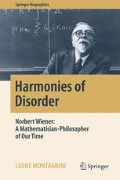Abstract
Norbert Wiener was born on 26 November 1894 in the US, in the town of Columbia, Missouri, where his father, Leo, a Russian Jew, had arrived 13 years earlier. His father taught modern languages at the local university, while his mother, Bertha Kahn , was a wealthy Missourian, also of Jewish descent, but with a bit of Lutheran blood in her veins.
Access this chapter
Tax calculation will be finalised at checkout
Purchases are for personal use only
Notes
- 1.
In the dedication (50j): “To the memory of my father LEO WIENER, formerly Professor of Slavic languages at Harvard University. My closest mentor and dearest antagonist”. The other dedications in Wiener’s books are: “To Arturo ROSENBLUETH, for many years my companion in science”, (48f1) and “TO MY WIFE. Under whose gentle tutelage I first knew freedom”, (53h); “To those inventors who have preferred the claims of truth to the gifts of fortune” (59e).
- 2.
Heims (1984 [1980], note 13, 418) notes that, in an earlier unpublished version of the autobiography, called A Bent Twig, “Leo Wiener’s rejection of Judaism and of the Jewish community is given greater prominence”.
- 3.
Moreover his mother used to repeat phrases disrespectful to Jews as other minorities, according hackneyed stereotypes: “Scarcely a day went by in which we did not hear some remark about the gluttony of the Jews or the bigotry of the Irish or the laziness of the Negroes” (64h [53h], 146); see also 64h [53h], 20).
- 4.
Fisch also cites Whitehead. But I prefer to omit this name, even though Wiener had a close relationship with him too, because Whitehead’s philosophy of the American period, focusing on the definition of process, belongs to a stage subsequent to the early Pragmatism which Wiener was so deeply influenced by.
- 5.
Leo Wiener interviewed by Bruce (1911). Cit. by Heims 1984 [1980], 6.
- 6.
Letter for doctoral submission, cit. by Grattan-Guiness 1975, 106.
- 7.
Here and elsewhere, for the profiles of the philosophers, when not expressly indicated, I am indebted mainly to Fisch 1996, Abbagnano 1995, Copleston 1996.
- 8.
Letter for doctoral submission, cit. by Grattan-Guiness 1975, 106.
- 9.
Bergson also maintained a dialogue with James’ thinking. See Bergson (1934), and in particular the chapter “Sur le Pragmatisme de William James”. An interesting connection is also to be found between Pragmatism and Boutroux ’ contingentism [see Boutroux 1911].
- 10.
Letter for doctoral submission, cit. by Grattan-Guiness 1975, 106.
- 11.
Ibid.
- 12.
Ibid.
- 13.
Letter for doctoral submission, cit. by Grattan-Guiness 1975, 106.
- 14.
Ibid.
- 15.
For this rather convincing judgment, it seems to me, I am indebted to the Italian neo-idealist Guido De Ruggiero (1921 [1912], 261 ff.).
Author information
Authors and Affiliations
Corresponding author
Rights and permissions
Copyright information
© 2017 Springer International Publishing AG
About this chapter
Cite this chapter
Montagnini, L. (2017). Formative Years. In: Harmonies of Disorder. Springer Biographies. Springer, Cham. https://doi.org/10.1007/978-3-319-50657-9_1
Download citation
DOI: https://doi.org/10.1007/978-3-319-50657-9_1
Published:
Publisher Name: Springer, Cham
Print ISBN: 978-3-319-50656-2
Online ISBN: 978-3-319-50657-9
eBook Packages: Mathematics and StatisticsMathematics and Statistics (R0)

